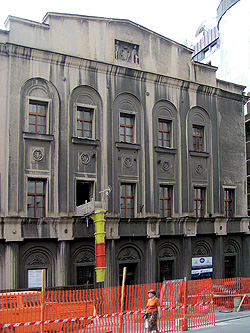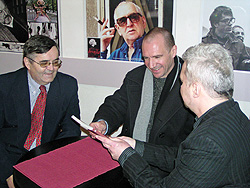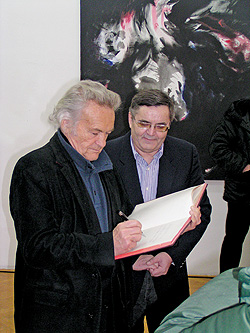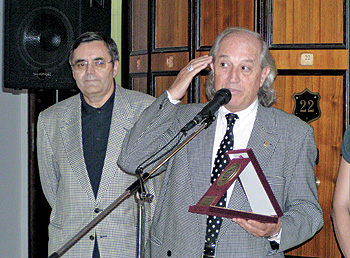Seventh Art
YUGOSLAV FILM ARCHIVE CELEBRATES ITS 60TH ANNIVERSARY
Treasury of the XX Century Memories
Film, the incomparable civilization and socio-cultural phenomenon, has not changed the century behind us, but has undoubtedly marked it. The modern language of the XXI century is also the language of film, language of motion pictures. The collection of films held at the Belgrade Film Archive, about 95.000 copies, is one of the three most significant in the world, and represents world heritage
By: Danijela Petrović
Photo: Film Archive
 It built and changed cultural history. It is one of the most significant national cultural institutions, a Serbian brand with literally international significance. It disposes with an impressive collection of about 95.000 film copies, the most significant library with film related books in the Balkans, exquisite fund of film magazines, rich collection of accompanying film material (close to 200.000 processed and as much unprocessed photos, about 200.000 posters, thereof 11.000 processed, about 900 scripts of domestic and about 9.000 scripts of foreign movies)! We should also add the significant collection of museum objects from the field of film technology, the most important being the original ”Lumiere” camera no. 335 from 1896. It built and changed cultural history. It is one of the most significant national cultural institutions, a Serbian brand with literally international significance. It disposes with an impressive collection of about 95.000 film copies, the most significant library with film related books in the Balkans, exquisite fund of film magazines, rich collection of accompanying film material (close to 200.000 processed and as much unprocessed photos, about 200.000 posters, thereof 11.000 processed, about 900 scripts of domestic and about 9.000 scripts of foreign movies)! We should also add the significant collection of museum objects from the field of film technology, the most important being the original ”Lumiere” camera no. 335 from 1896.
All this undoubtedly puts the Belgrade Film Archive to the very top of the world.
– Our film collection is considered one of the three most significant in the world. The French, Germans, Americans, Russians do not need foreign movies; they have their own cinematography with hundreds of films. We had a cinematography which, in the best times, produced a little over 30 films per year, so our Film Archive was mostly directed towards international production. As much as 80 percent of what we keep here belongs to world film heritage – says for National Review Radoslav Zelenović, director of Yugoslav Film Archive.
 All that priceless treasure could have disappeared in a moment in the war spring of 1999, during the NATO bombing of Serbia. The famous film director Bernardo Bertolucci wrote on April 4, 1999: ”The Yugoslav Film Archive is one of the two or three most significant film archives in the world, where crucial parts of memory of this century are kept. If memories are destroyed, it will mean the destruction of historical identity. Then future and past are the same.” All that priceless treasure could have disappeared in a moment in the war spring of 1999, during the NATO bombing of Serbia. The famous film director Bernardo Bertolucci wrote on April 4, 1999: ”The Yugoslav Film Archive is one of the two or three most significant film archives in the world, where crucial parts of memory of this century are kept. If memories are destroyed, it will mean the destruction of historical identity. Then future and past are the same.”
– The situation was dramatic. The Film Archive depot was hit and seriously damaged. 80.000 boxes of original material were damaged because water began coming inside. With great efforts of our people, we managed to save these films and move them to another place. Genocide of world proportions was about to happen. To make the paradox even bigger, a large portion of what was hit originated from the countries of the aggressor (French, American, Italian and German movies) – continues Zelenović.
SENSATIONAL DISCOVERY IN VIENNA
 In 1952, the Yugoslav Film Archive became the seventeenth member of the International Federation of Film Archives, which today gathers more than 130 film archives from the whole world. The European Community Association of Film Archives was founded in 1995, and the Yugoslav Film Archive became its thirteenth member. In 1952, the Yugoslav Film Archive became the seventeenth member of the International Federation of Film Archives, which today gathers more than 130 film archives from the whole world. The European Community Association of Film Archives was founded in 1995, and the Yugoslav Film Archive became its thirteenth member.
The archive, the heart of the Film Archive, has all most important film materials, from the Lumiere brothers and Thomas Alva Edison to the present time. Films from the Serbian history are a special treasure, such as Crowning of King Petar I directed by Englishman Arnold Muire Wilson in 1904, first saved film from our lands. Even today, this piece is considered one of the most significant early documentary reports of European cinematography. Its discovery in the Austrian Film Archive fund in Vienna was a true sensation. A number of movies of the first Serbian movie producer Svetozar Botorić were also found there. Among about fifteen of these priceless movies, the most valuable is certainly the first Serbian and Balkan motion picture Life and Deeds of the Immortal Vožd Karadjordje from 1911, directed by Čiča-Ilija Stanojević and Louis de Berry. Accident or coincidence of a higher level arranged that the film was found in the eve of celebrating two centuries from the First Serbian Uprising.
– For 80 years, the film about Karadjordje has been considered missing. I thought my heart would stop beating when I definitely realized what we found in the Vienna Archive. Up to then, a Romanian film from 1913 was considered the first Balkan film, however in that moment, after discovering Karadjordje, we changed the history of film. After showing it at the Festival of Silent Film in Pordenone, it turned out that Karadjordje, with its unusual length and manner of directing, is one of the particularly important films of that time – says director Zelenović.
WAITING FOR BERTOLUCCI
 – The first 20 years are a big problem in film archiving. The film was made in 1895. It is considered that only 10 percent of the films made until 1915 are preserved. After discovering Karadjordje and after saving some films we found in pieces, such as The Boatman’s Luck and With Faith in God, the percentage of preserved films about us from that period rises to almost 70 percent! I often say that there is no such thing as lost film, there are only films waiting for us to find them – says Zelenović. – The first 20 years are a big problem in film archiving. The film was made in 1895. It is considered that only 10 percent of the films made until 1915 are preserved. After discovering Karadjordje and after saving some films we found in pieces, such as The Boatman’s Luck and With Faith in God, the percentage of preserved films about us from that period rises to almost 70 percent! I often say that there is no such thing as lost film, there are only films waiting for us to find them – says Zelenović.
Marking a hundred years of film, the Film Archive established the ”Golden Seal” award. Among the past 25 winners are Giuseppe De Santis, Theo Angelopoulos, Peter Bacho, Nikita Mikhalkov, Emir Kusturica, Jirzi Menzel, Tomislav Pinter, Liv Ullman, Volker Schlöndorff, Andrei Konchalovsky, Daniel Olbricki, Charles Aznavour, Ken Russel....
– We first wanted to award only 20 ”Seals”. Then we realized there are many more important people who contributed to the history of film, so it would not be right to exclude them from the list. There is not a single winner of the ”Seal” who has not been in Belgrade or any who has not said that he was in excellent company, like Ralph Fiennes did recently at the FEST. Coming to Belgrade is a precondition to be awarded with the ”Golden Seal”. There are some people we have been waiting for a long time, such as Bertolucci – mentions Zelenović. – When Liv Ullman came to the Museum of the Film Archive, she immediately entered the cinema where her first film from 1957 was shown. She stayed long and we thought something happened to her. However, she stayed so her eyes would get used to the dark and so that she could count the audience. There were 57 people. ”Do these people know Norwegian?” she asked because the film did not have subtitles, and was amazed by the answer. The very fact that her first film was preserved surprised her.
In the Film Archive guest book, Giuseppe De Santis wrote that he knows only two film archives which have all 12 of his films: Belgium and Belgrade. Wim Wenders came to the Archive for one hour and stayed five and a half. He told me I was a very rich man and that he was sorry he was not rich. If he was, he said, he would invest ten million Euros into the Archive, tells us director Zelenović.
 The Film Archive will mark its 60th anniversary on June 6. Significant donations came during the previous years. France gave 500 thousand Euros for building a new depot. The European Agency for Reconstruction and Development donated about two million Euros for opening the Center for digitalization of archive material. Japan gave us a valuable film-editing desk. The Film Archive will mark its 60th anniversary on June 6. Significant donations came during the previous years. France gave 500 thousand Euros for building a new depot. The European Agency for Reconstruction and Development donated about two million Euros for opening the Center for digitalization of archive material. Japan gave us a valuable film-editing desk.
– That desk and the Center for digitalization completely changed the attitude towards the film archive. Now there is not a single film we cannot see in these lands. The latest technology reads films on flammable strips from the earliest period. Other carriers of pictures and sound are only deceptions. The reliability of DVDs is low, between two and eight years. We use digital technology to restore the picture and return it to thirty five millimeter strip. It lasts 100 years and more (we have such a strip from 1895) – explains Zelenović. – The construction of the new Film Archive building will be completed by June 6; however, we still do not have the means to equip it. We hope that, due to some new donation, we will soon be able to use this divine object. We are trained to preserve film strips and we want everything recorded on it in this country to come to the Archive, to be under one roof and noted in one system. However, for something like that, we will need to build another five depots.
***
 Nikita Nikita
– When Nikita Mikhalkov was in the Film Archive, he asked me to bring him two tennis balls. After the ceremony of awarding him with the ”Golden Seal” was finished, he asked us to take off our jackets and then held an unbelievable acting class. He brought people from the audience to the stage, gave them a tennis ball and told them what to do. He provoked certain states in them; it was the first time I saw anything similar. There were 300 people in our movie theater which otherwise has 180 places and everything was functioning perfectly. Nikita is unusually charismatic – remembers Radoslav Zelenović.
***
 Mama Juanita Mama Juanita
– It was very interesting when Columba Dominguez, actress from the film A Day of Life, one of the most popular films ever shown in our country, came to the Film Archive. She had been receiving letters from here for decades and then, at pretty old age, came from Mexico to Belgrade. There was great excitement in the Film Archive Cinema. Slavko Perović began singing the main theme from the movie in Spanish and Serbian, and Columba could hardly hold back tears. Reporters waited impatiently for her at the entrance, but she stayed to see the whole film because she had not seen it for 40 years.
***
 Role Role
– When I was informed Angelopoulos was coming, I thought he would visit us in 15 days. He cane in one and a half hour, entered and I stood up to greet him. He looked at me and said: ”I am making a movie in which the main character is the director of the Yugoslav Film Archive. However, you are too young for this role.” So my acting career failed – jokes Zelenović.
***
 Autograph Autograph
– Famous Harvey Keitel was in Belgrade the night when Piano won the Oscar. Tomorrow at 11, he held a press conference in the Film Archive, and then we went to Dom Sindikata, because one of his movies was shown there. People were in shock when they realized Keitel is in Dom Sindikata. They came with all kinds of paper to get an autograph. One young man did not have anything else and gave him his identification card. Keitel saw that it was a document, but the young man told him: ”I will easily get a new identification card, but I will hardly have the opportunity again to get an autograph from Harvey Keitel.”
***
New Discovery
– We found another nine early films concerning us in the Archive in Vienna. We will most probably show them as a complete novelty for our audience, like the movies of Djoka Bogdanović which have been restored in Russia – announces Radoslav Zelenović.
|
